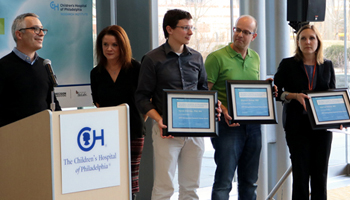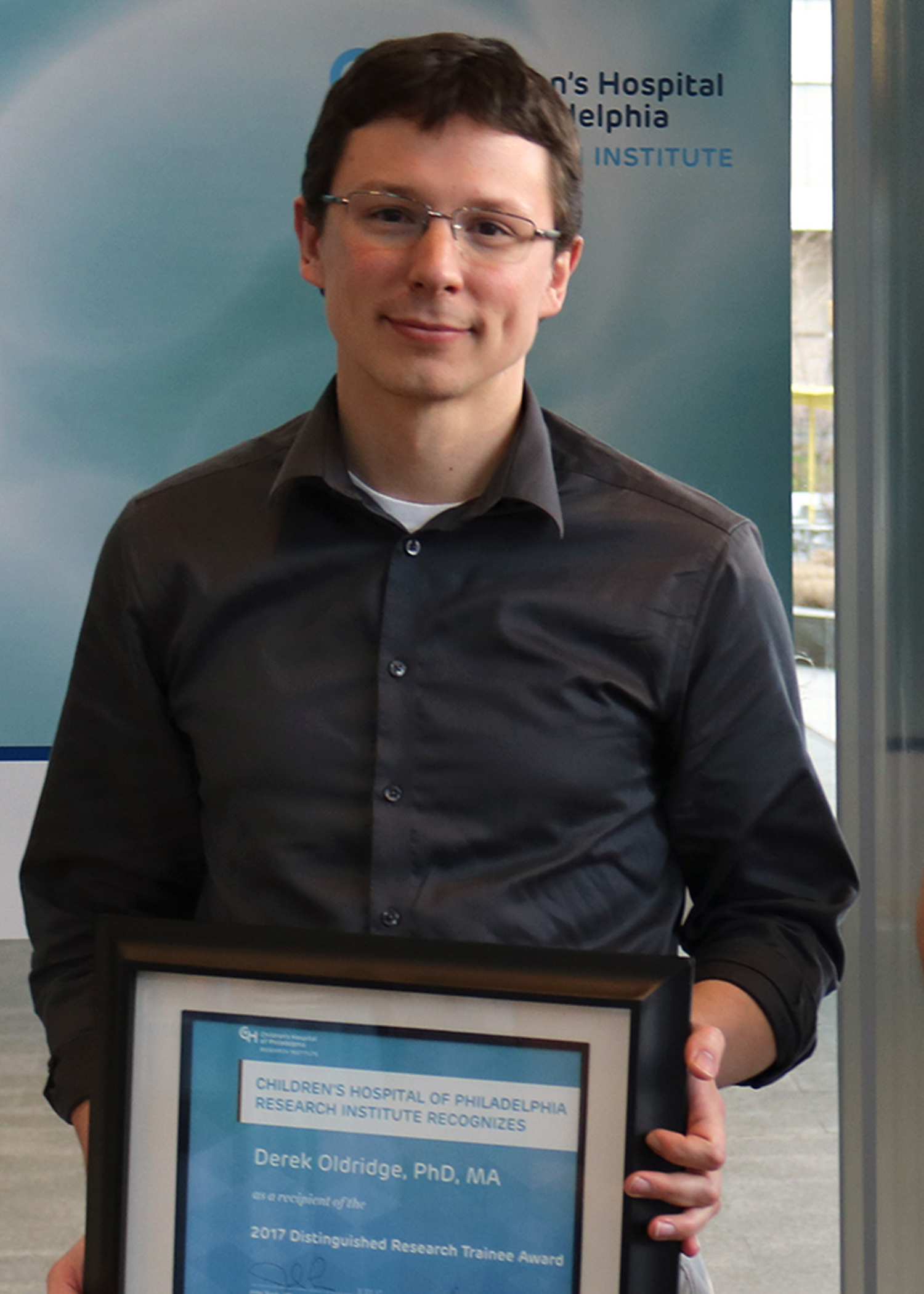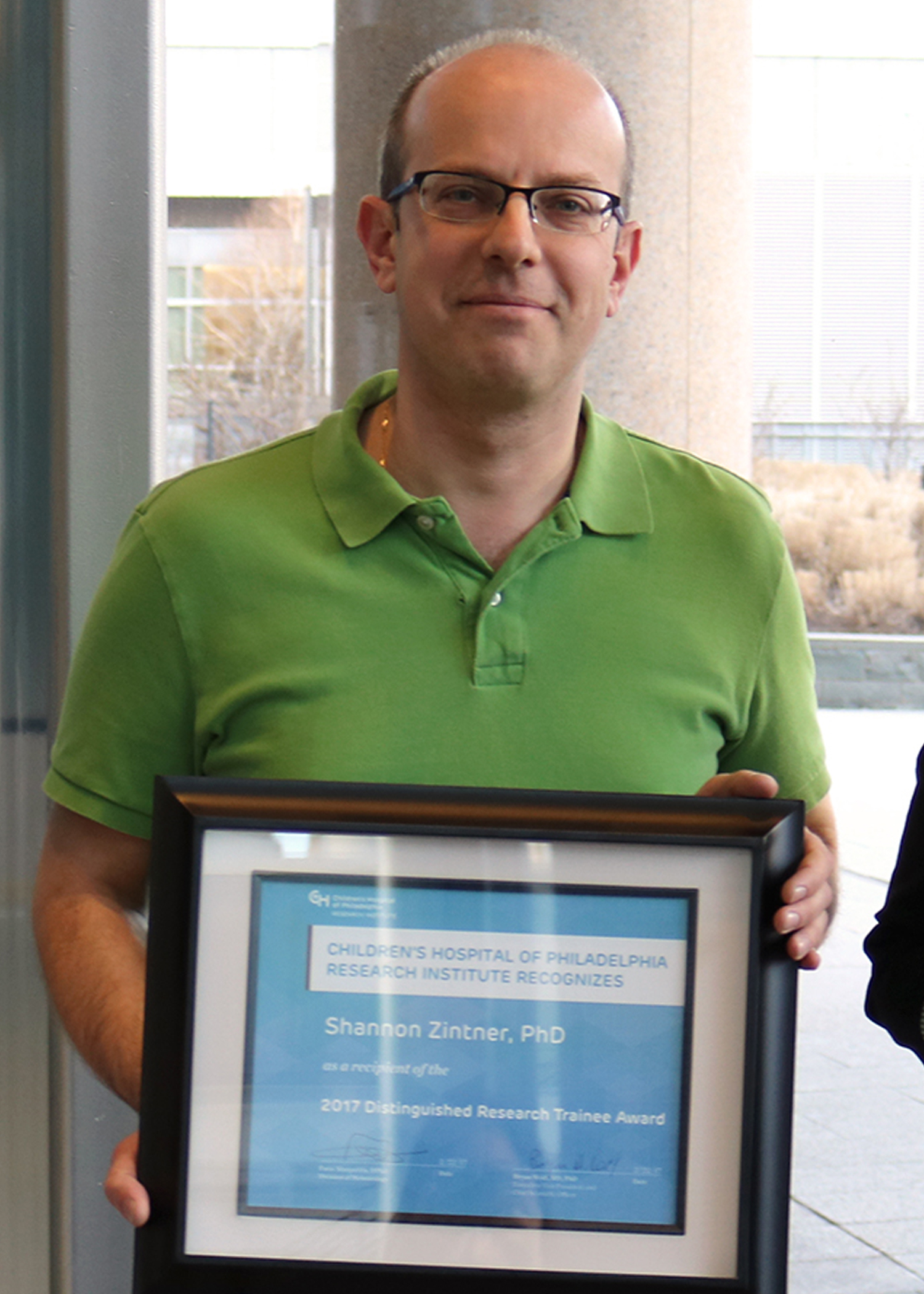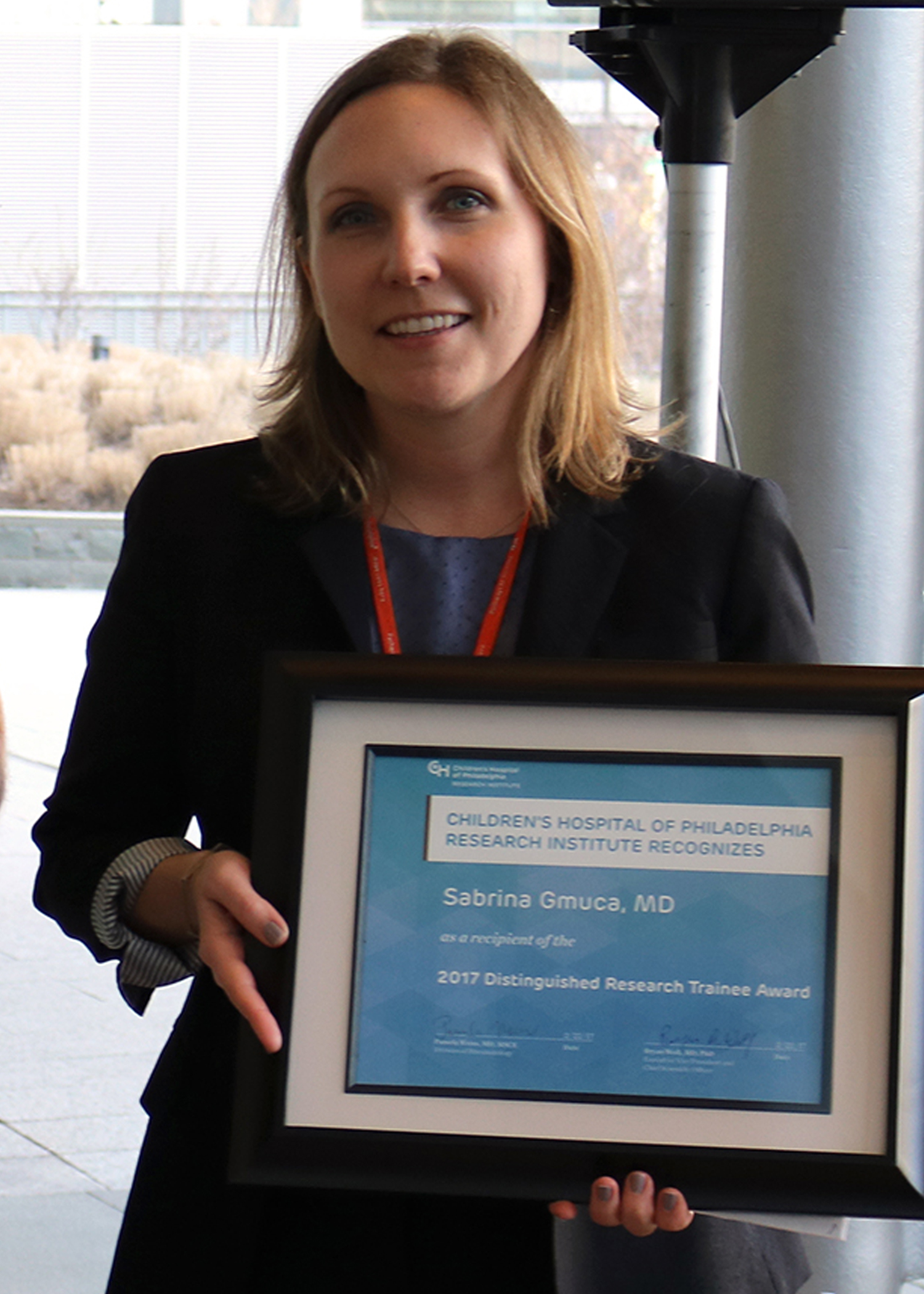HOW CAN WE HELP YOU? Call 1-800-TRY-CHOP
In This Section
Introducing the 2017 Distinguished Research Trainee Awardees
 Training the next generation of investigators has long been a priority at Children’s Hospital of Philadelphia. There are numerous opportunities throughout the year to celebrate the accomplishments of our trainees and honor their commitment to science.
Training the next generation of investigators has long been a priority at Children’s Hospital of Philadelphia. There are numerous opportunities throughout the year to celebrate the accomplishments of our trainees and honor their commitment to science.
One of the ways some of our up-and-coming investigators are honored is through the annual Distinguished Research Trainee Awards. These awards provide institution-wide recognition for exceptional CHOP Research trainees and offer an opportunity for mentors to highlight the work of their researchers-in-training.
The Research Trainee Advisory Committee at Children’s Hospital recently selected graduate student Derek Oldridge, PhD, MA; postdoctoral fellow Shannon Zintner, PhD; and physician fellow Sabrina A. Gmuca, MD, MSCE, as the recipients of the 2017 awards.
Genomics Research Leads to Honor for Driven Graduate Student
 Derek Oldridge, PhD, MA, is in his seventh and final year of MD/PhD training at the Perelman School of Medicine at the University of Pennsylvania and at CHOP after successfully defending his PhD in Genomics and Computational Biology in 2015. Described by his mentor John Maris, MD, as “an exceptionally self-driven scientist,” Dr. Oldridge received this 2017 Distinguished Research Trainee Award for his graduate work in genomics.
Derek Oldridge, PhD, MA, is in his seventh and final year of MD/PhD training at the Perelman School of Medicine at the University of Pennsylvania and at CHOP after successfully defending his PhD in Genomics and Computational Biology in 2015. Described by his mentor John Maris, MD, as “an exceptionally self-driven scientist,” Dr. Oldridge received this 2017 Distinguished Research Trainee Award for his graduate work in genomics.
Specifically, he used integrative epigenomics techniques to uncover a mutation linked to high-risk neuroblastoma by disrupting a GATA transcription factor binding site in an enhancer region of the LMO1 oncogene. According to Dr. Maris, who nominated Dr. Oldridge for the award, this work is one of the first examples in the pediatric cancer literature where the causal mechanism has been defined for a germline cancer susceptibility variant. This marks an important milestone in the risk stratification of children with neuroblastoma, Dr. Maris noted in his nomination, and it has laid the groundwork for genome-wide studies to obtain a comprehensive understanding of the contribution of non-protein coding genetic variations and mutations to disease susceptibility and prognosis.
Dr. Oldridge also studied neuroblastoma clonal evolution by comparing whole genome sequences in diagnostic and relapsed neuroblastoma pairs, the result of a collaborative project with both Dutch and French investigators that provides the data necessary to encourage pediatric oncologists to biopsy relapsed neuroblastoma and provide individualized treatments. In parallel with his PhD thesis work in neuroblastoma, Dr. Oldiridge has also made important contributions in the emerging field of cancer immunotherapy, leading the whole exome and RNA sequencing data analysis efforts to understand the molecular basis for why some children with B-cell acute lymphoblastic leukemia experience relapse of their cancer when treated with cellular immunotherapy directed at the CD19 B-cell antigen (CART19).
During his training, Dr. Oldridge published papers in the prestigious journals Nature and Nature Genetics, as well as several other publications, was honored by the International Society of Pediatric Oncology, and received numerous awards from the University of Pennsylvania. In parallel with his graduate work in genomics, he also completed an independent master’s degree in statistics from Wharton to solidify quantitative skills that will allow him to continue to excel as a genomic scientist.
“It is difficult to do justice to the diversity of Derek’s research experience, which previously encompassed experimental and computational fields of molecular biophysics and is presently focused in pediatric cancer genomics,” Dr. Maris said. “This background has granted Derek astounding versatility and creativity in approaching scientific problems.”
Dr. Maris added, “As someone who has trained many students over the course of my career, Derek is clearly one of the most creative and capable graduate students I have ever worked with and is clearly a star on the rise.”
Postdoctoral Fellow Recognized for Establishing New Hemophilia Model at CHOP

Paris Margaritis, DPhil, a researcher in the division of Hematology, accepts the Distinguished Research Trainee Award on behalf of postdoctoral fellow Shannon Zintner, PhD.
In 2014, postdoctoral fellow Shannon Zintner, PhD, joined the laboratory of her mentor, Paris Margaritis, DPhil, and rapidly acquired new and critical skills that led her to establish a new animal model of hemophilia at CHOP. The results of her industrious work resulted in the honor of a 2017 Distinguished Research Trainee Award from CHOP.
In particular, Dr. Zintner had to learn the in vivo methodologies in large and small animal models of hemophilia, including handling and complicated surgery. Because of the intricacies of the models, she also had to learn complex biochemical methodologies in recombinant protein purification, since such protein was to be used as a mode of treatment for those fragile animals.
“Neither skill is trivial to learn and, in my experience as a mentor, is very rare that one person can be good in both,” Dr. Margaritis said in nominating her for the award.
Aside from rapidly acquiring and applying her new skills, Dr. Margaritis pointed to Dr. Zintner’s persistent, focused, and determined personality, as well as her ability to grasp the nuances in science that led her to excel in all aspects of her work. He also cited Dr. Zintner’s “optimal approach” to troubleshooting when dealing with unexpected research results — seeing those results as a challenge.
Dr. Zintner’s work will form the basis of future experiments that not only address novel aspects of the pathophysiology of hemophilia but also focus on potential novel treatment approaches. Dr. Margaritis expressed his belief that Dr. Zintner’s existing and future work is likely to have a significant impact in the hemophilia society and the field of hemostasis research.
“Dependability, consistency, excellent record keeping, extreme attention to detail are additional characteristics that describe Dr. Zintner and her work,” Dr. Margaritis said, adding that the quality of her work reached the highest standards expected of trainees. “It is rare to find an individual that captures some of these, and I was (and continue to be) very pleased that Shannon manages to have all of these.”
Physician-Fellow Awarded for Innovative Rheumatology Research

The primary research interest of physician fellow Sabrina Gmuca, MD, centers on the treatment and outcomes of amplified pain. She worked with her mentor, Pamela F. Weiss, MD, MSCE, on several projects focusing on spondyloarthritis, a category of juvenile arthritis associated with axial arthritis. In the process, she developed several novel ideas of how to further explore altered pain perceptions in this group of children. Her groundbreaking work as part of her rheumatology fellowship led to her receiving a 2017 Distinguished Research Trainee Award.
Dr. Gmuca matriculated in the Master of Science in Clinical Epidemiology at the Perelman School of Medicine at the University of Pennsylvania during her first year of rheumatology fellowship at CHOP. Her thesis project focuses on pediatric chronic pain, which is a major public health issue with a high prevalence and socioeconomic burden. This is because children with pain syndromes have increased healthcare utilization, more mental health and social problems, and greater school absenteeism, while parents experience financial, social, and psychological consequences as they make life adjustments to cope with their child’s pain. Children with chronic pain also continue to experience it into adulthood. There is limited data supporting the treatment of chronic pain, and more in-depth investigation is needed to determine the best therapeutic approach.
By leveraging a large United States administrative healthcare claims database, Dr. Gmuca’s study will identify the prevailing pharmacologic treatment regimens for juvenile fibromyalgia as well as predictors of chronic opioid exposure. Her central hypothesis is that there exists significant unnecessary polypharmacy in the management of juvenile fibromyalgia and that a substantial proportion of these children are receiving chronic opioid therapy. A better understanding of practice variations in the treatment of juvenile fibromyalgia will inform treatment standardization guidelines. Thus, this proposed research is designed to significantly impact the field of rheumatology by highlighting the need for increased pediatric psychiatric care and the need for clearer guidelines for pharmacologic management of this chronic pain condition.
As part of her epidemiology training, Dr. Gmuca analyzed the data and was the presenting author of two abstracts at the 2015 American College of Rheumatology (ACR) Annual Scientific Meeting. One of these abstracts won CHOP’s Patient-oriented Research Award when later presented at CHOP’s Research Poster Day in February 2015. She also had a first author abstract accepted for presentation at the 2016 ACR Annual Scientific Meeting, and for this abstract she was awarded the prestigious Rheumatology Research Foundation Pediatric Research award.
“Dr. Gmuca is a talented and highly motivated young woman who has great potential to develop into a very productive physician scientist in pediatric rheumatology,” Dr. Weiss said. “She has both the clinical and epidemiologic training necessary to become an independent academic researcher and will likely make great contributions to the field of pediatric rheumatology. There are surprisingly few people researching the area of chronic pain and its intersection with rheumatology, so I suspect funding and enthusiasm for her planned research niche will be high.”